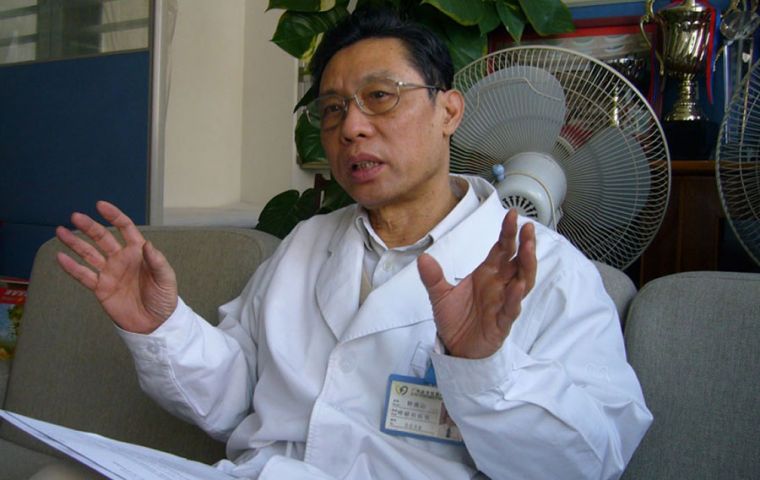MercoPress. South Atlantic News Agency
New Coronavirus strain human-to-human transmission confirmed; fears for Chinese New Year celebrations
 Zhong Nanshan, a renowned scientist who helped expose the scale of the SARS outbreak, said patients could contract the new virus without having visited the city.
Zhong Nanshan, a renowned scientist who helped expose the scale of the SARS outbreak, said patients could contract the new virus without having visited the city. A SARS-like virus that has spread across China and reached three other Asian nations is contagious between humans, a government expert said, and the World Health Organization announced that a key emergency committee would meet this week to discuss the infections. The news came as Wuhan health authorities reported on Tuesday that a fourth person had died of the coronavirus.
The new coronavirus strain, first discovered in the central city of Wuhan, has caused alarm because of its connection to Severe Acute Respiratory Syndrome (SARS), which killed nearly 650 people across mainland China and Hong Kong in 2002-2003.
The total number of people diagnosed with the new virus has risen to some 300. Beijing and Shanghai confirmed their first cases on Monday while more than a dozen more emerged in southern Guangdong province and 136 new ones were found over the weekend in Wuhan, according to state broadcaster CCTV.
Scientists have scrambled to determine the mode of transmission, with a seafood market in Wuhan believed to be the centre of the outbreak.
But Zhong Nanshan, a renowned scientist at the National Health Commission who helped expose the scale of the SARS outbreak, said patients could contract the new virus without having visited the city.
“Currently, it can be said it is affirmative that there is the phenomenon of human-to-human transmission,” he said in an interview with CCTV. In Guangdong, two patients were infected by family members who visited Wuhan, Zhong explained.
Fourteen medical personnel helping with coronavirus patients have also been infected, he said, though he added that more than 95 of the total cases were related to Wuhan.
Zhong predicted an increase of viral pneumonia cases during the Chinese New Year holiday - when millions travel in China - but expressed confidence in curbing the spread of the virus, China's official Xinhua news agency reported.
The WHO panel will meet in Geneva on Wednesday to determine whether to declare the outbreak “a public health emergency of international concern” - a rare designation only used for the gravest epidemics.
WHO said earlier that an animal source seemed to be “the most likely primary source” with “some limited human-to-human transmission occurring between close contacts.”
Wuhan has 11 million inhabitants and serves as a major transport hub, including during the annual Chinese New Year holiday, which begins later this week and sees hundreds of millions of Chinese people travel across the country to visit family.
Weighing in on the matter for the first time, President Xi Jinping said on Monday that safeguarding people's lives should be given “top priority” and that the spread of the epidemic “should be resolutely contained”, according to CCTV.
Xi said it was necessary to “release information on the epidemic in a timely manner and deepen international cooperation,” and ensure people have a “stable and peaceful Spring Festival”, the broadcaster said.




Top Comments
Disclaimer & comment rulesCommenting for this story is now closed.
If you have a Facebook account, become a fan and comment on our Facebook Page!